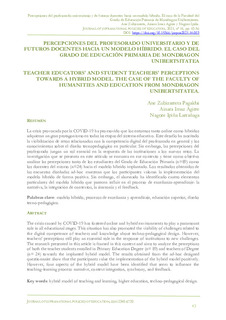Title
Percepciones del profesorado universitario y de futuros docentes hacia un modelo híbrido. El caso de la Facultad de Humanidades y Ciencias de la Educación de Mondragon UnibertsitateaPublication Date
2021xmlui.dri2xhtml.METS-1.0.item-contributorDepartment
KoLaborategiaVersion
Published versionDocument type
Journal ArticleJournal ArticleLanguage
SpanishRights
© Las autorasAccess
Open accessPublisher’s version
https://doi.org/10.15366/jospoe2021.14.003Published at
Journal of Supranational Policies of Education Nº 14, pp. 43-56. Número dedicado a: Competencias docentes, digitalización e inclusión: Claves para alcanzar el Objetivo de Desarrollo Sostenible 4 en tiempos de pandemiaPublisher
Universidad Autónoma de MadridKeywords
Modelo híbrido
Procesos de enseñanza y aprendizaje
Educación superior
Diseño tecno-pedagógico ... [+]
Procesos de enseñanza y aprendizaje
Educación superior
Diseño tecno-pedagógico ... [+]
Modelo híbrido
Procesos de enseñanza y aprendizaje
Educación superior
Diseño tecno-pedagógico
Hybrid model of teaching and learning
Higher education
Techno-pedagogical design [-]
Procesos de enseñanza y aprendizaje
Educación superior
Diseño tecno-pedagógico
Hybrid model of teaching and learning
Higher education
Techno-pedagogical design [-]
Abstract
La crisis provocada por la COVID-19 ha promovido que los entornos tanto online como híbridos
adquieran un gran protagonismo en todas las etapas del sistema educativo. Este desafío ha suscitado
la vi ... [+]
La crisis provocada por la COVID-19 ha promovido que los entornos tanto online como híbridos
adquieran un gran protagonismo en todas las etapas del sistema educativo. Este desafío ha suscitado
la visibilización de retos relacionados con la competencia digital del profesorado en general y los
conocimientos sobre el diseño tecnopedagógico en particular. Sin embargo, las percepciones del
profesorado juegan un rol esencial en la respuesta de las instituciones a los nuevos retos. La
investigación que se presenta en este artículo se enmarca en ese contexto y tiene como objetivo
analizar las percepciones tanto de los estudiantes del Grado de Educación Primaria (n=89) como
los docentes del mismo (n=24) hacia el modelo híbrido implantado. Los resultados obtenidos de
las encuestas diseñadas ad-hoc muestran que los participantes valoran la implementación del
modelo híbrido de forma positiva. Sin embargo, el alumnado ha identificado cuatro elementos
particulares del modelo híbrido que parecen influir en el proceso de enseñanza-aprendizaje: la
narrativa, la integración de contextos, la sincronía y el feedback. [-]
The crisis caused by COVID-19 has fostered online and hybrid environments to play a paramount
role in all educational stages. This situation has also promoted the visibility of challenges related to
... [+]
The crisis caused by COVID-19 has fostered online and hybrid environments to play a paramount
role in all educational stages. This situation has also promoted the visibility of challenges related to
the digital competence of teachers and knowledge about techno-pedagogical design. However,
teachers' perceptions still play an essential role in the response of institutions to new challenges.
The research presented in this article is framed in this context and aims to analyze the perceptions
of both the teacher students enrolled in Primary Education Degree (n= 89) and teachers of Degree
(n= 24) towards the implanted hybrid model. The results obtained from the ad-hoc designed
questionnaire show that the participants value the implementation of the hybrid model positively.
However, four aspects of the hybrid model have been identified that seem to influence the
teaching-learning process: narrative, context integration, synchrony, and feedback. [-]
Collections
- Articles - Education [128]





















